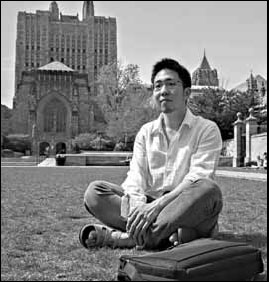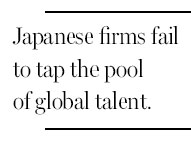Held back in Japan by a foreign degree
Updated: 2012-06-10 08:01
By Hiroko Tabuchi(The New York Times)
|
|||||||
|
Ronan Sato, an Oxford student, said Japanese companies "seemed cautious" about hiring him. Below, Kenta Koga, a student at Yale University, broke tacit rules by speaking up when he worked as an intern at a Tokyo ad agency. Hazel Thompson for The New York Times; below, Douglas Healey for The New York Times |
TOKYO - Ronan Sato, a graduate student in applied statistics at Oxford University, has always wanted to work in his native Japan. But at a careers fair for overseas Japanese students, he found that corporate Japan did not return his enthusiasm.
In meetings with a handful of Japanese financial trading firms at the forum in Boston last November, none would offer him a job without further interviews in Tokyo.
So Mr. Sato, who received three offers on the spot from non-Japanese corporations, accepted a position in Tokyo with a big British bank.

"I really wanted to gain experience at a Japanese company, but they seemed cautious," he said. "Do Japanese companies really want global talent? It seemed to me like they're not really serious."
Corporate Japan has long been wary of embracing Western-educated compatriots who return home. But critics say the reluctance to tap the international experience of these young people is a problem for Japan as some of its major industries lose ground in a global economy.
A shrinking portion of Japanese students is seeking education in the West. At the same time, Japan's regional rivals, including China, South Korea and India, are sending increasing numbers of students overseas.
"Japanese companies here are missing out on the best foreign talent, and it's all their fault," said Toshihiko Irisumi, a graduate of the University of Chicago Booth School of Business and former Goldman Sachs banker.
Others with Western educations recall Japanese recruiters referring to them openly as "over spec" - too elite to fit in, too eager to get ahead and too likely to switch employers.
In a survey last June by the Tokyo-based recruitment company Disco, fewer than a quarter of 1,000 Japanese companies said they planned to hire Japanese applicants who had studied abroad.
In some ways, the Japanese snubbing of Western graduates is a testament to the perceived strength of their own universities - despite mediocre showings in various global college rankings.
At American universities, 21,290 Japanese students were registered last year, fewer than half the number a decade ago - even though the overall number of Japanese enrolled in college has been constant, at around 3 million. American universities last year had 73,350 students from South Korea, which has less than half of Japan's population.
"There is an awareness that Japan's competitiveness is falling, and we need a more global work force," said Kazunori Masugo, head of the Senri International School in western Japan.
Ryutaro Sakamoto, who paid his way through the University of Toronto and returned to Japan at age 30 with a business degree, found he was too old to apply through standard recruitment programs. He sent resumes to the likes of Panasonic and Sony anyway, but never heard back. Eventually, the Japanese unit of the American insurance company Prudential put his bilingual skills to use.
"In Japan, taking the time to study overseas sets you back in the shukatsu race," he said.

"Shukatsu" refers to the system in which Japanese companies typically hire the bulk of their workers straight from college and expect them to stay until retirement. Not getting a job upon graduation is seen as a potential career killer.
"Shukatsu is like Kabuki theater," said Takayuki Matsumoto, an Osaka-based career consultant. "It's difficult when you don't fit the template."
His advice to returnees: don't be too assertive.
Kenta Koga, an undergraduate at Yale University in New Haven, Connecticut, interned at a big advertising agency in Tokyo but broke many rules by voicing his ideas. He was eventually excluded from meetings. He says he would never work for a Japanese company.
The Japanese financial giant Bank of Tokyo-Mitsubishi each year hires about 1,200 fresh graduates. Usually, fewer than 20 have studied overseas or are non-Japanese, said Keiichi Hotta, a recruiter for the bank. "Especially in finance, we don't want people who are focused on short-term gains," he said.
Norihiro Yonezawa, who studied for a year at the University of Maryland, said he did not emphasize overseas experience or English skills when he interviewed - successfully - for a coveted job at Panasonic.
"I didn't want to come across as a show-off. I made sure to emphasize that I would still fit in."
The New York Times
(China Daily 06/10/2012 page10)
